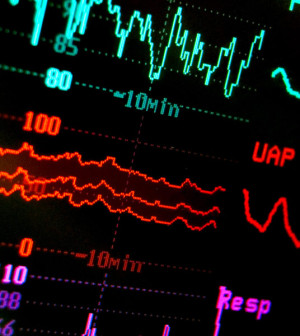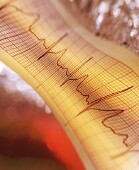- Could Your Grocery Store Meat Be Causing Recurring UTIs?
- Are You Making This Expensive Thermostat Error This Winter?
- Recognizing the Signs of Hypothyroidism
- 10 Strategies to Overcome Insomnia
- Could Artificial Sweeteners Be Aging the Brain Faster?
- Techniques for Soothing Your Nervous System
- Does the Water in Your House Smell Funny? Here’s Why
- Can a Daily Dose of Apple Cider Vinegar Actually Aid Weight Loss?
- 6 Health Beverages That Can Actually Spike Your Blood Sugar
- Treatment Options for Social Anxiety Disorder
Treating Irregular Heartbeat With Digoxin May Come With Risks


The widely used heart drug digoxin is associated with increased risk of death and hospitalization among patients who have the heart rhythm disorder atrial fibrillation but no evidence of heart failure, a new study finds.
Atrial fibrillation is a common form of irregular heartbeat that has been linked to a rise in risk for stroke among older Americans. Digoxin has been used for more than a century to help treat irregular heartbeat, the authors of the new study said, and many guidelines recommend the drug for the treatment of atrial fibrillation.
However, the new findings “suggest that the use of digoxin should be re-evaluated for the treatment of atrial fibrillation in contemporary clinical practice,” study co-author Dr. Anthony Steimle, chief of cardiology at Kaiser Permanente Santa Clara Medical Center, said in a Kaiser news release.
One expert wasn’t surprised by the findings.
“In my experience as an electrophysiologist, specializing in heart rhythm, I’ve seen time and again that digoxin can be toxic to atrial fibrillation patients, proving useful in only a tiny subset who are bedridden,” said Dr. Soad Bekheit, director of electrophysiology services at Staten Island University Hospital in Staten Island, N.Y.
The new study involved nearly 15,000 adults who were recently diagnosed with atrial fibrillation and had no prior history of heart failure or digoxin use. During the three-year study, more than 4,800 of the patients began taking digoxin.
Those who took digoxin had a 71 percent higher risk of death and a 63 percent higher risk of hospitalization than those who did not take the heart drug, according to the study published online Nov. 21 in the journal Circulation: Arrhythmia and Electrophysiology.
“Given the other options available for heart-rate control, digoxin should be used with caution in the management of atrial fibrillation, especially in the absence of symptomatic systolic heart failure,” Steimle believes.
“Digoxin remains commonly used for rate control in atrial fibrillation, but very limited data exist to support this practice — mostly small, older clinical studies with very limited follow-up that did not assess the long-term effects of digoxin on mortality or hospitalization,” added study senior author Dr. Alan Go, a research scientist at the Kaiser Permanente Division of Research in Oakland, Calif.
A 2013 study by the same research team found that digoxin was associated with a 72 percent higher risk of death among adults recently diagnosed with systolic heart failure.
One expert agreed that it may be time to re-evaluate the use of this very old drug in patients with atrial fibrillation.
“This study is certainly in keeping with what many heart rhythm doctors have been generally saying about the use of digoxin over the past years,” said Dr. Conor Barrett, director of the Arrhythmia Institute at Mount Sinai St Luke’s and Mount Sinai Roosevelt Hospitals in New York City.
“We know that digoxin use alone does not satisfactorily regulate heart rates in active individuals; this has limited its use to more sedentary individuals,” he pointed out.
However, “given the findings of this study,” other medications such as beta blockers or calcium channel blockers might be a better alternative for these patients, Barrett said.
Bekheit agreed. “Other, newer drugs have been shown to be safer and more efficient than digoxin for atrial fibrillation patients,” he said. “While I won’t say digoxin should never be used, it should be prescribed only with great caution.”
More information
The U.S. National Heart, Lung, and Blood Institute has more about atrial fibrillation.
Source: HealthDay
Copyright © 2026 HealthDay. All rights reserved.










